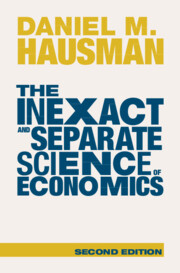Book contents
- The Inexact and Separate Science of Economics
- The Inexact and Separate Science of Economics
- Copyright page
- Contents
- Figures
- Tables
- Introduction
- Part I Introduction: Content, Structure, and Strategy of Mainstream Economics
- Part II Theory Assessment
- 9 Inexactness in Economic Theory
- 10 Mill’s Deductive Method and the Assessment of Economic Hypotheses
- 11 Methodological Revolution
- 12 Karl Popper and Imre Lakatos
- 13 The Inexact Deductive Method
- 14 Casting off Dogmatism
- Part III Conclusion
- Appendix An Introduction to Philosophy of Science
- References
- Index
14 - Casting off Dogmatism
The Case of Preference Reversals
from Part II - Theory Assessment
Published online by Cambridge University Press: 25 May 2023
- The Inexact and Separate Science of Economics
- The Inexact and Separate Science of Economics
- Copyright page
- Contents
- Figures
- Tables
- Introduction
- Part I Introduction: Content, Structure, and Strategy of Mainstream Economics
- Part II Theory Assessment
- 9 Inexactness in Economic Theory
- 10 Mill’s Deductive Method and the Assessment of Economic Hypotheses
- 11 Methodological Revolution
- 12 Karl Popper and Imre Lakatos
- 13 The Inexact Deductive Method
- 14 Casting off Dogmatism
- Part III Conclusion
- Appendix An Introduction to Philosophy of Science
- References
- Index
Summary
Chapter 14 presents a case study of the reactions of economists to experimental work on preference reversals. In this instance, the profession has not relied on an unacceptably dogmatic view of theory appraisal. Such dogmatism as there has been stems from the commitment of economists to a vision of economics as a separate science. The discussion in this chapter is an illustration rather than an argument for the interpretation of the evolution of economic methodology defended in Chapter 13. As we shall see, the initial reactions of economists to the anomalous results of experiments carried out by psychologists are very different than current attitudes.
Keywords
- Type
- Chapter
- Information
- The Inexact and Separate Science of Economics , pp. 370 - 394Publisher: Cambridge University PressPrint publication year: 2023

